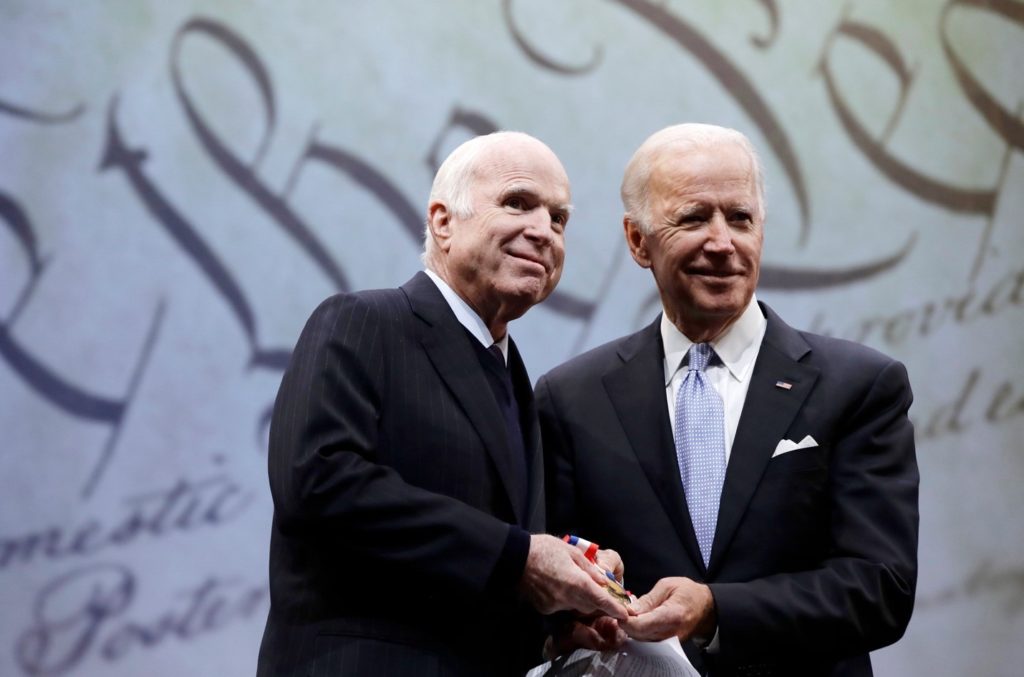I really admire my colleague Randy Lioz’s recent column on forgiveness in politics. He argues that politicians are human beings like the rest of us, and that more important than escaping accusations of mistakes is owning up to them and being willing to change. As he writes:
“I would much rather be led by a flawed but honest person than by one who maintains their spotless veneer by painting over it with lies.”
I couldn’t agree more, and while the “gotcha” political culture of outrage which has developed in recent years might be good for media ratings and feelings of self-righteousness, it is not good for our country.
So this week, when Joe Biden was criticized for making several women uncomfortable with his tendency to be a bit too touchy-feely, I was saddened. This criticism made a mountain out of a mole-hill, and stirred up a frenzy of indignation where quiet chiding would have sufficed. It has threatened Joe’s chances of becoming the Democratic nominee for President, and obscured his admirable character.
I don’t mean to deny that his tendency to invade people’s personal space is a problem and needs to stop. It is a well-known foible of his and has been for years. It shouldn’t have taken this long for him to address it. Apparently it’s part of his family and cultural upbringing. But certainly in today’s cultural milieu, it is indeed inappropriate, and it must stop.
But when we’re dealing with potentially offensive behavior, intention is everything. People say and do lots of dumb things while intending the best. Unintentionally offensive behavior still needs to be brought to attention, of course, but it is hardly a worthy target of outrage and condemnation. I haven’t heard a single one of Biden’s accusers suggesting that his behavior was in any way intended to be sexual or suggestive. I haven’t heard a single argument that his touchy-feeliness is anything other than a friendly instinct to connect with the person in question.
Indeed, I can hardly think of a politician in the last forty years whose integrity is less questionable than Joe’s. His wife Jill tells the wonderful story of their first date, which ended not in her bedroom but at her front door with Joe shaking her hand and wishing her a good night. She immediately called her mom and explained “I finally met a gentleman”.
At the time Joe was a sitting U.S. Senator, and Jill was nine years his junior. It was a classic scenario in which many might use the power imbalance to their advantage. Not Joe. No one who has followed Joe Biden’s career could be surprised by Jill Biden’s recounting of their first date, because it really encapsulates Joe’s whole career and character. In a sea of politicians who engage in plenty of seedy and immoral behavior, Joe stands out as a gentleman. In a sea of politicians and presidential hopefuls jockeying to develop a winning image, Joe has always been himself and emphasized who he really is– his identity—over any tailored political image. This is far more than most politicians can say.
Based on the events of the last week, it seems like Joe finally understands that some of his habits cross a line for some people, and that he needs to recognize and address that. He apologized for making the women uncomfortable, and admitted that cultural norms have changed and that he will change with them. I’m not sure what more anyone could ask of him. What he would not do– and what some can’t forgive him for –is say that he did something horrible and is ashamed of it. While many politicians would say anything (however contrived) to escape from peril, Joe would rather remain “flawed but honest” than maintain a “spotless veneer by painting over it with lies.” I admire him for such courage.
Other commentators have recently suggested that Joe’s political life– as honorable as it has been– should now be over, and that he’s simply out of step with the culture and priorities of today’s Democratic party. To these observers, he represents an older generation – white, privileged, and out of touch – whose time has come to step aside for a new generation. They look to the exciting diversity of the current Democratic field as evidence that a fresh voice and fresh perspective are needed.
But however well-intentioned this view might be (I agree that all else being equal, diversity is a good thing), I agree with Chief Justice John Roberts that “the way to stop discrimination on the basis of race is to stop discriminating on the basis of race.” Of course, the same could be said for discrimination based on gender, sexual orientation, et cetera. To suggest that being a white man disqualifies Joe from being the Democratic nominee is reverse discrimination in its most obvious form. To me it seems illogical to respond to the historic discrimination of minorities by practicing reverse discrimination against non-minorities. It is real discrimination, and it is a cure almost as bad as the original disease.
I don’t care about any candidate’s race, gender, religion, or sexual orientation. I only care about his or her ideas, character, and policies for the country, and am suspicious of the suggestion that other factors should take priority over a candidate’s ideas, character, and policies. Suggesting that another person is blinded by privilege opens up a Pandora’s box of evils. If Joe Biden or any other white man is doomed to be blinded by his privilege, he becomes “less than,” no longer able to interact as an equal, perpetually subordinate to those who have been oppressed, those formerly oppressed who alone can see reality clearly. He can’t trust himself, and he can’t be trusted by those who are “woke” and enlightened. This sounds a lot like discrimination in its classic form, and I’m very worried about going down this path.
Still other commentators have recently criticized Joe for being a moderate centrist, and he’s even been criticized for “liking”, supporting, and even in one case campaigning for Republicans. I can understand why this would be concerning to the more progressive wing of the Democratic party. For those who care deeply about progressive issues, I can completely understand why Biden would be a disappointment. But such voters, along with their counterparts on the far right, seem to under-emphasize the essential nature of our democratic system of government: it only works when consensus is built.
Policies rammed through with only the slimmest margins of support—think Obamacare on the left and Brett Kavanaugh’s nomination on the right—might be satisfying in the short term, but they tend to harm the country in the long term. Only when broad-based consensus is built—think the Civil Rights Act or Welfare Reform—is healthy, long-term progress made. Of all the candidates in the field at the moment, Joe Biden seems to offer the best chance of consensus-building.
Barack Obama seemed to offer it in 2008, which is why so many conservatives, including myself, supported him. But President Obama ended up being unable or unwilling to follow through with his promises of healing our polarized culture. While no single person can do all the work of depolarization, which can only be done at the grass-roots level by millions of citizens, leadership at the top is still crucial to facilitate and speed up the process. Of all the candidates currently in the field, Biden is the one with the record and temperament most qualified, I think, to offer a truly non-polarizing campaign and presidency.
I could even imagine him doing something truly thrilling if he runs, selecting a moderate Republican running mate like John Kasich. Such a bi-partisan ticket would send a tremendously strong message in these polarized times, and frankly I can’t imagine anyone currently in the field except Joe Biden doing such a courageous thing. For me, character and the ability to govern in a non-polarizing way are far more important, right now, than specific policy views.
Finally, Biden is worthy of praise because he is a Democrat that many Reds and Independents can support. The ability to attract bipartisan support is one of the most important traits a national candidate can possess. Biden can not only win back the moderately conservative voters who voted for Obama but switched to Trump—I believe he can also win over some consistently Republican voters who supported President Trump but did not vote for President Obama. Many who voted for Trump did so not because they like the man’s character, but because in 2016 only he was speaking to issues they knew to be central, issues like cultural identity, trade, manufacturing, and other concerns of the working class. Biden has always and can continue to speak to these issues and these voters. This is a kind of politics sorely lacking in our current climate.
I’m not a Democrat. But for all these reasons above and more, I like Joe Biden, a man and politician worthy of praise.
Photo: Matt Rourke/Associated Press, from The New York Times.





2 thoughts on “In Praise of Joe”
Justin makes an interesting argument that legislation that narrowly passes Congress tends to be vulnerable to being repealed or undermined by future Congresses (eg. Obamacare). I’d like to see a broader sampling of bills and how they fared over time before I’d agree that such a correlation is the norm.
Erica, thanks for your thoughtful comment. I’m not a historian, but my opinion that lasting legislation requires consensus is based party on analyses like this one: https://www.theatlantic.com/politics/archive/2013/09/the-most-controversial-laws-of-the-last-100-years-the-stimulus-and-obamacare-are-1-and-2/279899/
In it, the author makes the claim that “In the last 100 years, no major lasting legislation has passed over 100 percent opposition from the other party. Until Obamacare.” Take a look and let me know what you think!